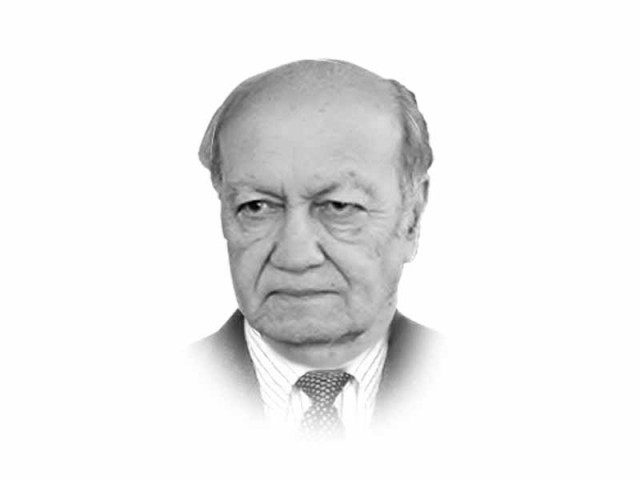India’s dangerous belligerence
Answer for India & Pakistan does not lie in shedding more blood of innocents, but in settling differences via talks

The writer is a retired lieutenant general of the Pakistan Army and served as chairman of the Pakistan Ordnance Factories Board
One should then assume that these were fleeting gestures by Narendra Modi. The understanding and cooperation needed to fight terrorism seems to be regrettably missing. India is on a highly aggressive trajectory pursuing a policy of bullying Pakistan whenever and wherever it can. The brazen shooting of two of our soldiers when they were proceeding for a flag meeting on the LoC violated rules of engagement and all international and bilateral norms. India’s foreign minister rejected Sartaj Aziz’s demand that appropriate action be taken against those responsible for the incident.
What exactly is driving New Delhi to pursue the policy of confrontation? Taking advantage of Pakistan’s current vulnerabilities, the Indian leadership probably considers this an opportune moment to build maximum pressure on us. India is trying to compel Pakistan to rein in jihadi elements (Lashkar-e-Taiba and others) as it has in respect of the Taliban and the Haqqani network on the western border. Pakistan is unlikely to agree unless the Indian government is prepared to engage with it on the Kashmir issue. With Modi’s high priority being to consolidate the Centre’s hold on Jammu and Kashmir, talks with Pakistan are only a remote possibility. India’s Kashmir policy is to suppress genuine resistance to Indian occupation and divert attention from real issues. And the external component of this policy is to keep Pakistan militarily engaged by demonising it for border violations and supporting infiltration of militants. The Indian arrogance speaks for itself when it terms negotiations or any form of bilateral engagement with Pakistan, a concession.
India is also unhappy with Pakistan’s improved relations with Afghanistan. Its hawkish establishment has pursued the double envelopment strategy, whereby India panders to Afghanistan and expects that it maintains an antagonistic relationship with Pakistan. Former Afghan president Hamid Karzai was obliging India on that score but President Ashraf Ghani has a new regional outlook and a constructive approach towards Pakistan. Being farsighted and pragmatic, he sees the inherent advantages of maintaining good relations with Islamabad. The irony is that he is not seeking a cooperative relationship with Pakistan at the expense of India. Ghani recognises India’s importance as a key regional player and major source of economic assistance. But India’s problem is that it wants to leverage its influence in Afghanistan to outmanoeuvre Pakistan.
President Barack Obama’s forthcoming visit to India could be another factor contributing to this hard posturing. By projecting Pakistan in bad light, Modi expects to reverse the recent marked improvement in relations between Pakistan and the US. The concern is that there is a history of escalation between the two countries. Prolonged tension on the border accompanied by a war of words and hyped nationalism could result in troops facing each other eyeball to eyeball. Similar confrontation led to a major build-up of forces on the international border in 2001.
The role of media on both sides is questionable. They are completely siding with their respective governments and not taking any position that could be helpful in reducing the tension. Swept by nationalist sentiment, they are playing to the tune of hardliners.
Today, the Taliban threat, which is an internal one, has united Pakistan, but the external threat from India remains a huge distraction. There was hope that the new governments in India and Pakistan, which enjoyed nearly two-thirds majority, would make a new beginning towards peace. On the contrary, Modi’s National Security Adviser, Ajit Doval, who is supposed to be a master of psychological warfare, has categorised Pakistan as an enemy. He recently articulated his highly controversial “offensive-defensive” doctrine in a speech at a university. The salient features of it are to befriend Pakistan’s enemies and exploit them for inflicting maximum damage. Any “misadventure” by Pakistan will be dealt through a composite response that will inflict disproportionate damage to major elements of national power. Defence Minister Khawaja Asif’s rejoinder that “India wants to engage Pakistan in a low-intensity war” is correct. It appears India is upset with the gains that Pakistan is making in its fight against insurgents and the growing cooperation with Afghanistan. At the international level, there is not much interest in South Asia. The world is pivoted on the Middle East, Ukraine and Russia. Moreover, India has sufficient clout to prevent the US or the UN from playing any constructive role.
India could have a genuine grievance about the release of Zakiur Rehman Lakhvi on bail and the inordinate delay in the finalisation of his case. Unfortunately, this is how sluggish the legal system in South Asia is. Pakistan has a similar complaint with India as the accused of the Samjhauta Express tragedy have been released on bail and the court case has lingered on for years. Instead of both countries cooperating and taking measures to bring terrorists to justice, they are caught in their rivalry. Indian attitudes towards Pakistan cannot be based on the Mumbai incident forever. France and Germany fought two wars in the last century inflicting massive death and destruction on each other, yet realising the gains of cooperation, have overcome their prejudices. The answer for India and Pakistan does not lie in shedding more blood of innocent citizens and soldiers, but like mature nations, they need to settle differences through negotiations. Also, according to the Simla Agreement, the two sides are supposed to settle matters through bilateral engagement.
Published in The Express Tribune, January 7th, 2015.
Like Opinion & Editorial on Facebook, follow @ETOpEd on Twitter to receive all updates on all our daily pieces.















COMMENTS
Comments are moderated and generally will be posted if they are on-topic and not abusive.
For more information, please see our Comments FAQ